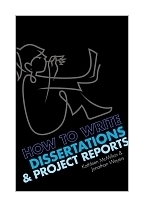|
||
• wydawnictwa polskie
• Zamów informacje o nowościach z wybranego tematu • kontakt
• Cookies na stronie |
HOW TO WRITE DISSERTATIONS AND PROJECT REPORTSWEYERS J. MCMILLAN K.wydawnictwo: PEARSON , rok wydania 2009, wydanie Icena netto: How to write great dissertations and projects provides all of the tips and techniques that a student is likely to need to choose, research, write and present dissertations and projects that will guarantee you top marks. Table of Contents
Introduction 1. Tackling a dissertation or project report– how to do your best right from the start 2. Choosing a dissertation or project report– how to decide on a theme for your investigation Planning your research 3. Writing a proposal – how to structure a successful dissertation or research proposal 4. Time management – how to write your dissertation or project while balancing family, work and leisure 5. Planning for dissertations – how to begin your research and evolve a model for your writing 6. Planning for experimental projects – how to organise your efforts effectively Finding and filtering information 7. Information literacy – how to make the best use of the library resources 8. Effective academic reading- how to read efficiently and with understanding 9. Analysing and evaluating source material- how to filter and select relevant material as part of the research process 10. Note-making from source material- how to create effective notes to support your dissertation and project research Applying research techniques 11. Principles of quantitative research – how to obtain and analyse numerical information 12. Principles of qualitative research – how to obtain and analyse descriptive information 13.Experimental research and field visits – how to develop and apply your skills 14. Thinking critically- how to develop a logical approach to analysis and problem-solving Working with Data & Numbers 15. Number crunching- how to solve problems in arithmetic and algebra 16. Interpreting and presenting data- how to understand & produce graphs, tables & basic stats Addressing issues of plagiarism, referencing & ethics 17. Plagiarism and copyrightinfringement - how to avoid being accused of ‘stealing’ the ideas & work of others 18. Citing and listing references– how to refer appropriately to the work of others 19. Ethics in researching and reporting – how to follow good research practice Writing a first draft 20. Structuring a dissertation- how to organise your writing within a standard framework 21. Structuring a project report- how to select and shape your content appropriately 22. Academic writing style - how to adopt appropriate language conventions Editing, revising and presenting 25. Reviewing, editing & proof-reading- how to make sure that your writing is concise and correct 26. Exploiting feedback- how to understand and learn from what your supervisor writes on your work 27. Presentation of dissertations and reports – how to follow the appropriate academic convention 304 pages, Paperback
Po otrzymaniu zamówienia poinformujemy, |


